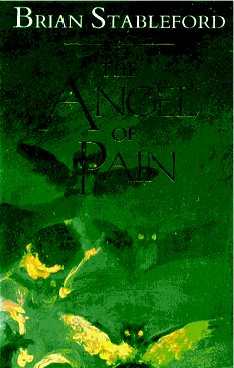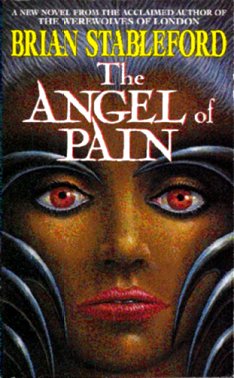| Home |
| Novels |
| Collections |
| Translations |
| Non-Fiction |
| Short Stories |
| Anthologies |

David is not the only one caught up in the net cast by the fallen angels - who need men to serve as their eyes and hands on earth. The newly-awakened angels have paused to make careful study of the much-changed world of men, but they have not abandoned their ambitions, nor have their anxieties been soothed. Now, they require even more of their human instruments.
David must undertake the strangest journey in human history, extending his visionary enlightenment to the furthest limits. It is a journey which he cannot make alone, but his companions may yet prove to be his deadliest enemies.
David's task is to discover the truth of what the fallen angels really are, but he cannot tell what effect the revelation will have on the beings which have used him so cruelly for so long. And his mission cannot succeed, unless he can first come to terms with the Angel of Pain.
Jacket painting: Escena de Brujas by Goya. Jacket design by Andrea Pinnington.
Published
in 1991 by Simon & Schuster.
ISBN: 0-671-71727-8

He is caught up in the net cast by the fallen angels, those newly-awakened beings who need humankind to serve as their eyes and hands on earth.
David's task, to discover the truth about the fallen angels, starts him off on the strangest journey in human history, a journey he cannot undertake alone... but his own companions may yet prove to be his deadliest enemies.
And David's mission cannot ever succeed, unless he can come to terms with the Angel of Pain
"An absolutely extraordinary
book " - JOHN CLUTE, INTERZONE
"A bright light in a widening abyss..." - FEAR
Cover illustration by George Underwood.
Published
in 1993 by Pan.
ISBN: 0-330-32607-4

David is not the only one caught up in the net cast by the fallen angels who need men to serve as their eyes and hands on earth.. The newly awakened angels have paused to make a careful study of the much- changed world of men, but they have not abandoned their ambitions, nor have their anxieties been soothed. Now, they require even more of their human instruments.
David must undertake the strangest journey in human history, extending his visionary enlightenment to the furthest limits. It is a journey which he cannot make alone, but his companions may be his deadliest enemies.
David's task is to discover the truth of what the fallen angels really are, but he cannot tell what effect the revelation will have on these beings who have so cruelly used him for so long. And his mission cannot succeed, unless he can first come to terms with the Angel of Pain.
Jacket design: Tony Greco & Associates Ltd.
Published
1st August 1993 by Carroll & Graf.
ISBN: 0-88184-932-4
ISBN: 0-78670-286-9
Translated into French as: L'Ange de la douleur.
Translated into Polish as: Aniol Cierpienia.

